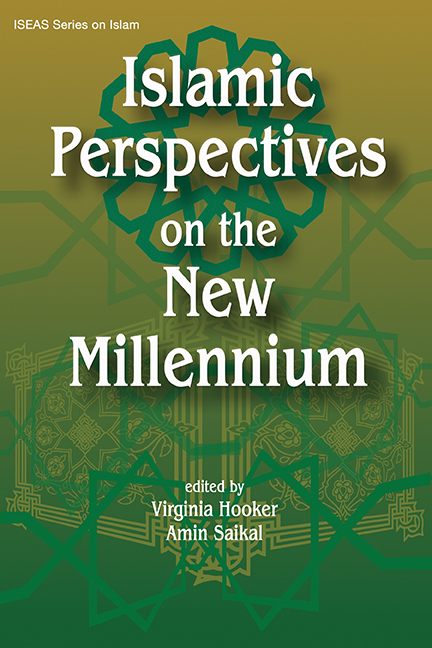Book contents
- Frontmatter
- Contents
- Acknowledgements
- Contributors
- 1 Islamic Perspectives on the New Millennium
- The New World Order
- The New Age
- The Economy
- 6 Financial Activism among Indonesian Muslims
- 7 Islamic Banking and Finance: In Search of a Pragmatic Model
- The Nation-State
- Muslim Women
- Law and Knowledge
- Conclusion
- Glossary
- Index of Names
- Index of Subjects
6 - Financial Activism among Indonesian Muslims
from The Economy
Published online by Cambridge University Press: 21 October 2015
- Frontmatter
- Contents
- Acknowledgements
- Contributors
- 1 Islamic Perspectives on the New Millennium
- The New World Order
- The New Age
- The Economy
- 6 Financial Activism among Indonesian Muslims
- 7 Islamic Banking and Finance: In Search of a Pragmatic Model
- The Nation-State
- Muslim Women
- Law and Knowledge
- Conclusion
- Glossary
- Index of Names
- Index of Subjects
Summary
This chapter describes the dynamics of the Islamic perspective on the economy within the context of Indonesia. It argues that in modern times, particularly during the New Order period and the reformation afterwards, a significant number of Muslim intellectuals have been developing ideas on an Islamicinspired economic system, and some have been implemented together with the communities. Islamic economic discourse and activism are playing an important role in the economic recovery of Indonesia. It became one of the determinant factors in transforming the Muslims' creed and religiosity. This will also play a role in determining the type of relationship between religion (Islam) and state in Indonesia.
The perspective shall be discerned by looking into the increasing awareness and activism of Indonesian Muslims in economic and business matters, both at the conceptual-ideal level and in their implementation programmes. It starts with a brief introduction on Islam in Indonesia and the general issue of Islamicity in this developing nation-state. This is followed by a discussion of the economic challenges and Islamic ideals, as well as the efforts to transform certain Islamic values and principles into the national legislation. Some of these ideals have been put into practice and some programmes have been implemented, and this will be the focus of the next section. Lastly, I deliberate on the prospects of the resurgent activism.
ISLAMIC STATE OR ISLAMIC SOCIETY?
Among the most controversial issues at stake for Muslims, and for researchers of Islam alike, is the seemingly simple question: “What is Islam?” Muslims may differ on the exact definition, let alone on the details, but they seem to agree that Islam means “submission to Allah”. One who submits to God (Allah) is a Muslim. One who does not is excluded from the community of the faithful. How far a Muslim submits himself or herself to the will of God depends on how he or she perceives the role and function of the religion in his or her life.
Islam came to Southeast Asia quite late compared to the expansion of Islam in the Middle East, Central Asia, and North Africa. It was brought by Muslim traders whose religiosity was shaped more by Sufi inclination. The legal-normative stance came later, and with it came another wave of puritanism and a modernist movement.
- Type
- Chapter
- Information
- Islamic Perspectives on the New Millennium , pp. 91 - 112Publisher: ISEAS–Yusof Ishak InstitutePrint publication year: 2004

